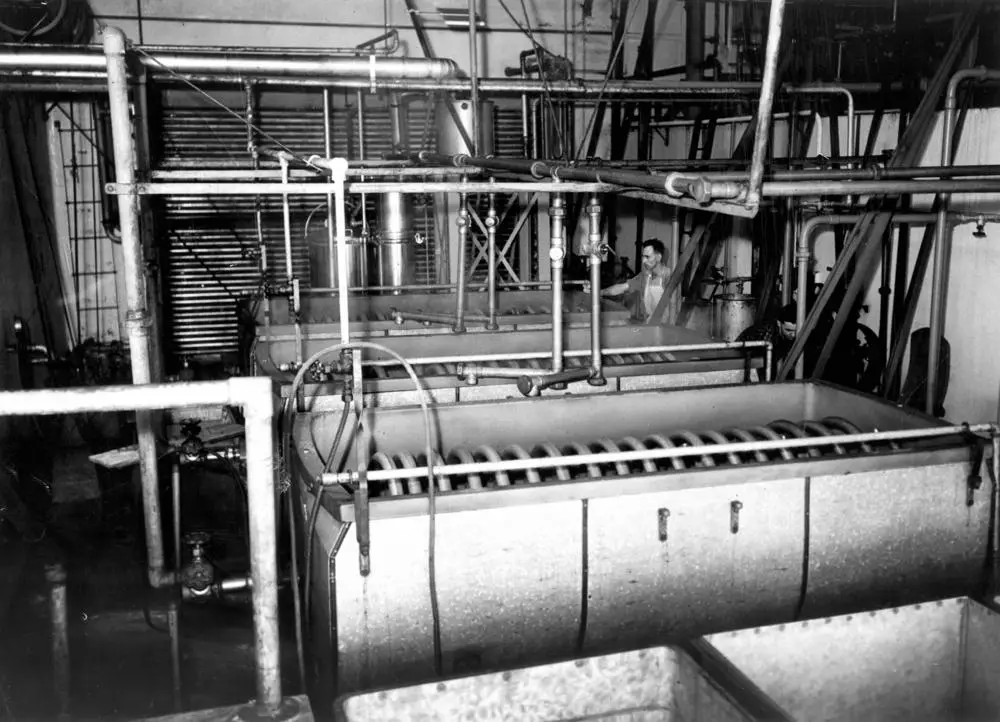What is Cottage Cheese Pasteurization?
Pasteurization involves heating milk to high temperatures to remove microorganisms or pathogens. The minimum heat for pasteurization is 145°F, typically done for short shelf life refrigerated milk products. However, temperatures can reach up to 280°F for ultra-pasteurization, which can dramatically increase the shelf life of milk. You will notice ultra pasteurization for many organic milk products if you ever read their labels.
After pasteurization, the milk is quickly cooled to a temperature below 41°F to prevent any remaining bacteria from multiplying. This process helps to ensure the safety and quality of the milk before it is packaged and shipped to consumers.
Is Cottage Cheese Pasteurized?
Almost all cottage cheese brands in supermarkets are pasteurized. The methods of pasteurization can vary from manufacturer to manufacturer, but almost all milk products are marked as being pasteurized to associate safety with the product. While we could not find exact numbers on cottage cheese sold using raw (unpasteurized) milk, it is believed that no more than 1% of milk sold to consumers in the United States has not been pasteurized.
Pasteurize milk and dairy products clearly dominate the market. Below we have provided a sample of the pasteurization verbiage found for some of the major cottage cheese brands.
Daisy: “Yes, our products are made with pasteurized milk and cream.”
Organic Valley: The labels show the use of “Organic Cultured Pasteurized Skim Milk”
Borden: The ingredients show “Cultured Pasteurized Nonfat Milk” is used.
Horizon Organic: The company states: “Pasteurization is the process of heating milk to make it safe from harmful bacteria and to increase its longevity. For our half gallon and gallon products, Horizon uses both high-temperature short-time (HTST) pasteurization, and ultra-pasteurization (UP). HTST milk is labeled “pasteurized,” while UP milk is labeled “ultra-pasteurized.”
Hood: The products use “Cultured pasteurized skim milk”.
Lactaid: The cottage cheese product uses “Cultured pasteurized skim milk.”
Prairie Farms: All cottage cheese products were listed as “pasteurized”.
Kalona SuperNatural: “At Kalona SuperNatural , we use two methods of low-temperature pasteurization: Batch pasteurization (also called vat pasteurization) and High Temperature/Short Time (HTST) pasteurization”. Its cottage cheese is HTST-pasteurized.
Risk of Consuming Unpasteurized or Raw Milk
According to the Centers for Disease Control and Prevention (CDC), raw milk is one of riskiest foods to consume to acquire a foodborne illness. They indicate the following: “Getting sick from raw milk can mean many days of diarrhea, stomach cramping, and vomiting. Less commonly, it can mean kidney failure, paralysis, chronic disorders, and even death.” They state that “Pasteurization is the only way to kill many of the bacteria in milk that can make people very sick.” They reports that between 1998 through 2018 there were 202 outbreaks and 2,645 outbreak-associated with drinking raw milk (source).
Many raw milk advocates believe that pasteurization diminishes many of the healthy vitamins or nutrients found in raw milk. However, the Food and Drug Administration debunks this as a myth stating that pasteurization does not reduce the nutritional value of milk.
We suggest reading this article from the Food & Drug Administration regarding raw milk misconceptions for additional details on the topic. You can also visit a source such as Raw Milk Institute which provides many counter arguments.
Conclusion
Nearly all cottage cheese you will find in stores will be made from pasteurized milk. The cottage cheese container should be marked with verbiage stating “pasteurized” or something similar, in case you have any doubts before buying. Check with the manufacturer if you have any questions regarding the pasteurization of their products. While there is a debate over raw milk vs. pasteurize milk, we will save that lengthy topic for another article.

